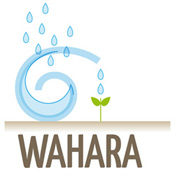WAHARA - Water Harvesting for Rainfed Africa
Introduction to the WAHARA project
In the variety of contexts in Africa – from arid to humid – the availability of water has become increasingly important, making an improved capture and usage of water essential. To ensure a continuous water supply for agricultural crops, water harvesting has been carried out in the earliest agricultural practices; however the environment has changed, as well as the number of people depending on it.
This is where the WAHARA project will make a difference: four countries, four pilot projects, one goal: increasing the potential of water harvesting.
Home
WAHARA project closed successfully
- Details
- Created on Monday, 07 November 2016 12:40
- Written by Erik van den Elsen
The WAHARA project has been officially closed as of February 29th 2016. This website will no longer be maintained, but will remain available in its current state.
The two main project aims have been written down in the project proposal:
- This project aims to study local water harvesting solutions, in order to innovate and develop appropriate water harvesting technologies that are replicable in the different geographical regions of rain fed Africa.
- The project aims to develop solutions applicable beyond local study sites and across the continent. In order to reach this objective, representative study sites are selected: Tunisia in the North, Burkina Faso in the West, Zambia in the South and Ethiopia in the East. Working with a trans-disciplinary perspective that takes into account not only biophysical aspects, but also socio-economic aspects and political conditions, the project will work closely together with various stakeholders, to make sure that selected solutions really meet their needs.
The people in the WAHARA project have been working on these two important aims for five years with great dedication. The project team from Europe (Netherlands, United Kingdom) and Africa (Ethiopia, Tunisia, Burkina Faso and Zambia) have been collaborating to establish the project aims. We think we have been successfull in achieving the project aims.
The project result has been laid down in the final publishable summary - document, that, together with the official deliverables and project reports have been approved by the European Commission.
An important quote from the executive summary:
WAHARA results overall indicate that water harvesting technologies not only work but have great potential. And, the expertise to actually do this is in principle available too. However, while the concept of WH, retaining runoff for productive use, is universal and simple, making it work is not. It requires adjusting to conditions that cannot be changed while making smart adjustments among those that can be. However, the bio-physical and socio-economic conditions are numerous, interconnected, often conflicting, and they differ widely between locations, even at short distance, as well as over time. Moreover, the real adaptation challenge is not to make a WH technology work under new conditions but to make it worthwhile; the expected benefits must be realised with limited resources, without taking a lot of time and for enough people. Introducing a new WH technology must demonstrate direct economic sense locally. Critical for sustained economic success are policy support, local ownership, local skills and inputs, access to adequate finance, profitable markets, private sector involvement and availability of services as well as professional farmers who can make the WH investments profitable. This explains why WH doesn’t spread easily; there can be no adoption without adaptation.
The WAHARA project team.
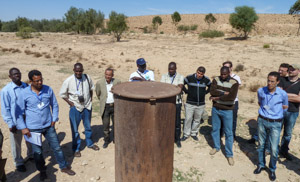
Part of the WAHARA project team on a field trip in Tunisia.
WAHARA final meeting held in Zambia
- Details
- Created on Wednesday, 03 February 2016 11:43
- Written by Erik van den Elsen
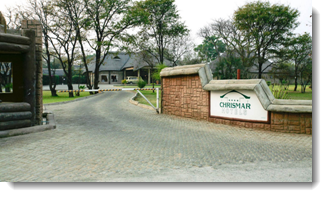
The final meeting of the WAHARA project was held from 8-12 February 2016 in Livingstone, Zambia. The meeting was hosted by GART.
The venue of the meeting was the Chrismar hotel in Livingstone. All partners of the WAHARA project were present, and on wednesday, also a number of local stakeholders from the 4 study sites from Ethiopia, Tunisia, Burkinas Faso and Zambia were be present to share their experiences about the Water Harvesting technologies that have been tested in the different partner countries.
The program of the meeting can be downloaded HERE.
Minutes of the WAHARA meeting in Ouagadougou available
- Details
- Created on Monday, 30 November 2015 09:49
- Written by Erik van den Elsen
 The official minutes of the recent plenary meeting held in Ouagadougou, Burkina Faso, are available for download in the download section. The plenary meeting was held from 6-9 July 2015, and was hosted by partner institute INERA.
The official minutes of the recent plenary meeting held in Ouagadougou, Burkina Faso, are available for download in the download section. The plenary meeting was held from 6-9 July 2015, and was hosted by partner institute INERA.
The report can also be downloaded using the link HERE.
WAHARA article published on HORIZON
- Details
- Created on Friday, 09 October 2015 07:44
- Written by Erik van den Elsen
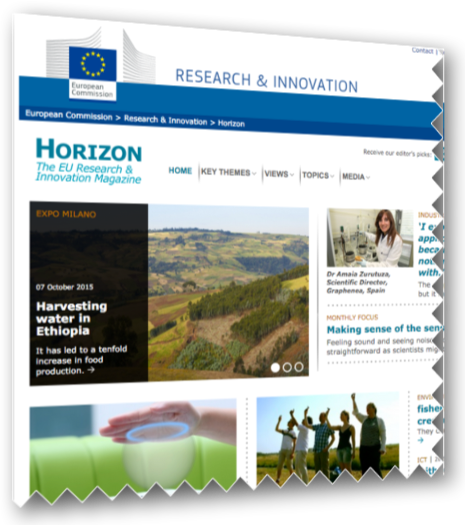
This week, an article was published on the European Research & Innovation Magazine 'Horizon' about the work that WAHARA has been doing in Ethiopia. The article describes the work of Dr. Kifle Woldemariam and his colleagues, and the results they have achieved in the context of water harvesting.
So-called water harvesting on small-scale farms over the past four years has helped annual crop yields rise from 500 to 5 000 kilogrammes per hectare, when combined with other soil management measures, according to Dr Kifle Woldemariam, coordinator of the Ethiopian study site for the WAHARA research project.
On average, the Ethiopian smallholders involved in the project have around half a hectare of land that they use to raise crops and livestock to feed their families and make a living.
'With this much land, if they can get enough water and improve their soil through different management practices, they are able to support their families,' Dr Woldemariam said. ‘Otherwise they could remain food insecure, as they are all small-scale farmers who are very poor and very sensitive to various rainfall and climate related challenges.'
The complete article can be read online here: http://horizon-magazine.eu/article/harvesting-water-ethiopia_en.html
WAHARA plenary meeting successfully closed
- Details
- Created on Tuesday, 14 July 2015 08:51
- Written by Erik van den Elsen
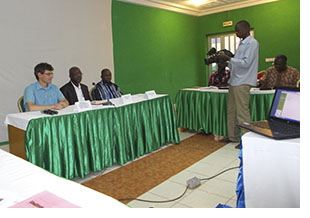
Burkina Faso - July 9th 2015. The WAHARA plenary meeting that was held from July 6-9 in Ouagadougou, Burkina Faso was closed by project leader Rudi Hessel.
"We had a successful meeting, with a number of fruitful discussions" according to the project leader. "Although there is still a lot of work to be done, the results are very promising, and we are looking forward to concluding the project in 2016." The meeting was successfully organised by WAHARA partner INERA, and specifically Sawadogo Hamado and his team. Two days of meetings and presentations alternated by a field day, where local water harvesting solutions were viewed and discussed.
The next, and final, project meeting will be held in the beginning of 2016.
For project partners, the presentations of the Burkina Faso meeting can be downloaded from the download page after logging in.













